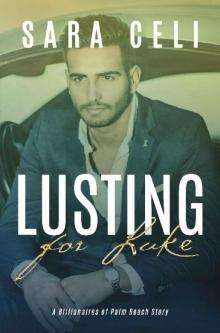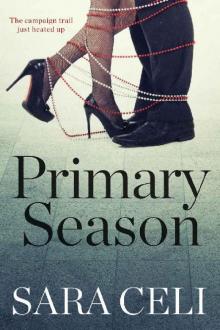#SoBasic Read online
Page 2
He cleared his throat. “When I heard about it, I started reviewing the rest of your employment record at the station. You haven’t met expectations.”
“I haven’t?” He might as well have been speaking Chinese. “But my posts get some of the highest views out of all the station content. And I have a huge following on my Social Kitten account. Whenever I talk about WCIN, I reach a whole new audience.”
“Social Kitten is for you, Margot. Not the company. I don’t care what you do with your personal account. It’s not quantifiable for our bottom line.”
“But—”
Oh, God. The death knells. This was actually happening.
A tennis ball sized lump swelled in my throat. I was getting fired. Fired. I’d never been fired for anything in my life. This didn’t happen to women like me. Ever.
“I also never marginalized or stereotyped an ethnic group.” I frowned as I searched through my brain, trying to figure out what I had said through the day, and to whom. I came up with nothing. Nada. Zilch. “Nope. No. I never did that. I wouldn’t do that.”
“I know that you’re aware of this from the company handbook,” Scott said. “We discussed it during the mandatory training session in February, and everyone had to sign that they understood the new rules in place. We made the position very clear, Margot. I’m at least willing to give you that.”
“It’s all to be a more inclusive work environment,” Marsha said, her voice flat and monotone. “SunCom wants to make sure all employees feel appreciated and like they have a voice, especially the most marginalized groups and points of view on our teams.”
I barely heard her. I was still thinking about all the recent interactions I’d had with my coworkers. Nothing seemed odd, nothing seemed like it would qualify as part of Scott’s accusations. But then …
“Oh my God.” I sank deeper into my chair as realization washed over me. “The Guatemalan coffee.” I glanced from Scott to Marsha and back again, hoping to get confirmation of what I suspected. Both gave away nothing. “It was that, wasn’t it?” I looked out at the newsroom through the large panel of windows on the far side of Scott’s office. “It was Lisa.”
Lisa sat at her workstation, typing away, seemingly oblivious to this meeting. But of course, she did. Bitch. She’d always had it out for me, and now she was about to succeed in getting me removed from her orbit forever.
“Lisa complained, didn’t she?” The questions raced out of my mouth as I pieced together the events. Damn it, if I hadn’t gone to that stupid coffee station, I might still have a job. “You should know that she has always been out to get me. She’s had a problem with me since my first month, when my ratings on the five outdid the one she used to get on the same show. She has never liked me. Never.”
I decided to omit the time Lisa yelled at me in the production booth a few weeks before, when I’d mistimed one of the satellite interviews from DC. She’d called me every name in the book that day, and ever since, things had been even worse between us.
Why had I bothered with small talk this morning?
“We’re not at liberty to discuss the authors of anonymous complaints,” Marsha said. “That is against the company handbook.”
“Lisa is making this up,” I insisted. My voice grew louder, frantic. “She’s lying. You must understand that. She’s out to destroy me, and she has been for months. I never said anything culturally insensitive. I merely asked her about some coffee grounds because I was trying to be friendly. It wasn’t racist or marginalizing.” I grasped for something to defend myself, but their blank expressions told me nothing I said would convince them. “That’s not me. I’m not like that. I merely asked her about the type of coffee she’d brought to share with the office.”
“Interesting.” Marsha looked at the top paper on her stack. “That’s in direct conflict with the information we received. Very different.”
“So, it was her, wasn’t it?”
Scott’s hand sliced through the air. “As Marsha mentioned, we aren’t at liberty to discuss the nature of this matter, and in this case, a second complaint occurred with the first. But this conversation has already gone too far.” He squared his shoulders. “We need to move on. I’m afraid that as of this moment, Margot, your services here at SunCom National Media are no longer needed.”
That was it. There it was. The decision had already been made. I had been a dead woman walking the minute I stepped foot into Scott’s office.
My stomach tightened then lurched. For a moment, I thought I might throw up right there, all over the carpet and the crap littering Scott’s desk. I’d never been fired before.
Never.
“We have a few papers for you to sign,” Scott said. “And Marsha has worked out a severance package. We feel that our offer is very generous. One week’s full pay, tacked on to your last paycheck. We wish you the best, Margot.”
It was final. And real. He’d just given my career the guillotine. Wasn’t there a word for this? Defamation of character? Libel? Was this even allowed?
Scott motioned to Marsha, and she handed me a stack of papers that included paperwork I briefly scanned. Most of it seemed like legal mumbo-jumbo that absolved SunCom National Media of any liability related to my dismissal, assured them that I understood the nature of it, and demanded I wouldn’t sue the company for wrongful termination.
Dazed, I signed on the bottom line of every page.
“I gave this job my best effort,” I said after the last agreement had my signature. “I don’t think you’re being fair.”
Scott waved a hand. “The policy is clear. Regardless of what you might think, we don’t have any choice in this matter.”
I narrowed my eyes at him. He did have a choice, and he knew it. He had a choice to keep me employed, but he didn’t want to do it.
“I’ll escort you out,” Marsha said. “We’ll stop by your desk and get your things.”
My final moments at WCIN passed in one mind-numbing blur. Marsha walked me to my desk, where I packed up the few belongings that differentiated my cubicle from the ones in the remaining rows. A few coworkers gave me sympathetic, stricken looks, but the non-disclosure agreement I’d signed in Scott’s office prevented me from telling them anything about my departure.
Not that I wanted to talk about something so embarrassing. I just wanted to go home and block out the horrible end to this day. I wanted to find a way to forget everything. This day. This job. This … failure. In a flash, my journalism career had derailed. Exploded.
What the hell would I do now?
The ceiling of the master bedroom in my apartment had sixty-eight swirls of plaster. I counted them all. Three times. Then I counted the cracks. Four of those. Four times sixty-eight is two hundred seventy-two.
I rolled onto my left side and stared at the gray wall across the room. When I thought I might go cross-eyed, I turned over onto my right side and did the same thing. I willed the minutes to pass. I don’t know that many did. Disgusted with myself and only partially distracted, I unhooked my phone from the charger on my nightstand, unlocked it, and searched aimlessly through the news of the morning. Being a news hound was in my blood, and I couldn’t help myself.
And it worked for a while. The stock market seemed set for a good opening, half the USA gymnastics team planned to retire before the summer Olympic Games, and Tanner Vance, Hollywood’s highest paid star, would soon star in the latest James Patterson film adaptation …
But … blah, blah, blah.
I should have gotten drunk last night.
What a shame I didn’t. It would have taken the edge off and might have ensured I’d sleep later than nine on the first wide-open Tuesday I’d had in five years. A half dozen shots of bourbon and the cheap wine in my refrigerator would have knocked me out cold. Dulled the pain. Made my sad excuse for a life look less pathetic.
But I’d been too shocked and embarrassed to get drunk when I got home from work.
Micro-aggressions? Cultural ins
ensitivities? Distraction from job duties? What in the world? That wasn’t me. I didn’t dismiss other groups and points of views. I went out of my way to be sensitive to others. And my online following was an asset to the job. Couldn’t they see that? If someone kept up with WCIN because they heard about it from me, that was a good thing.
This was Lisa. Lisa-the-sociopath. Lisa-the-monster. What happened to me was one hundred percent her doing. She wanted me gone, and she got it. She was probably threatened by me. That was the only thing that made sense.
Shrew.
I got out of bed and shuffled to the shower. When the water warmed up, I stepped under the soothing stream, my thoughts turned for the millionth time toward the crushing fallout that came with losing my job.
Oh, God …
If Lisa had really wanted to hit me where it hurt, she’d more than succeeded. The looming bills swirled in my head as the water fell around me. Rent, student loans, a credit card balance, cable, Wi-Fi, car insurance, and food costs all taunted me. One week of severance would get me through the end of the month, but if I didn’t find a job after that, I’d have to dip into my savings. And sadly, I only had about one thousand in that account. Barely enough for one unexpected bill.
Not as bad as most people, but not great, either.
I couldn’t go long without a job, and I’d have to make some immediate changes to my budget to free up cash. For starters, that meant at least canceling cable and more nights cooking dinner.
I wiped the water and remaining soap from my face. I could do this. I could fix this. I’d done a decent job of taking care of myself for the last few years, and I wouldn’t give that up for anything. I was an adult, and that was what adults did. They made cuts when they needed to and didn’t rely on others to bail them out of bad situations.
Right?
After my shower, it felt so surreal to dress in black leggings, a casual T-shirt, and a lightweight fleece. I should be in my pencil skirt, blouse, and heels. I padded into the kitchen, opened the fridge door, and realized I had almost nothing to eat in the apartment. Of course.
“Well, at least this will get me outside,” I said aloud to the refrigerator door. I found my purse on the floor in the hallway, grabbed my keys from the hook by the front door, and headed outside.
It was raining.
Shit.
If only I hadn’t left my umbrella at a bar downtown. That had seemed like such a minor thing at the time, but now I would have given anything to have some shelter from the rain. Still, I remained undaunted. I needed groceries, and I needed them immediately.
I zipped my jacket, hunched my shoulders, shoved my hands in my pockets, and sprinted toward my car.
Just as I reached the red Honda Accord that my parents gave me for graduation from NYU, the raindrops began falling harder. I unlocked the driver side door with the key fob and slid inside seconds before thick droplets began pounding the glass and metal with a vengeance. No matter. I was safe and dry inside my car. At least I had that going for me, on a day when I needed one thing to go my way.
“Okay, Margot,” I said aloud. “Just calm down. Focus, and go to the grocery store.”
I turned the key. The car sputtered and growled, but the engine refused to start. Instead, it sounded like two alley cats in heat.
Oh, God.
I tried again. Another loud grind, but no engagement.
Oh, no.
On the third try, I watched the instrument console flicker and die as the engine attempted to connect.
Fuck. My. Life.
I slammed my palms against the steering wheel and let out a low howl. A dead battery was not what I needed. Not after being fired. Not while it was pouring. Not when I knew it would cost about $150 to fix, and I’d just started a new budget …
No.
Couldn’t the universe see I needed a break? I laid my forehead on the steering wheel and took a few deep breaths as the rain pounded. This was the kind of thing no one talked about, the secret no one explained during childhood. The truth was—adulting was really starting to suck. Majorly. It was turning into a series of unfortunate events and setbacks designed to keep a person down. When everything seemed to be going right, something happened, and life would fall to pieces.
And the last twenty-four hours had just turned my theory into law. Margot’s Law. Margot’s Law of Reality. I could probably write a thesis on it, using my life as the main data.
After a few minutes of wallowing in misery, I raised my head off the wheel. If it was a dead battery, that was an easy fix. Surely a five-year-old Honda wouldn’t have anything major wrong, but I could look anyway.
I popped the hood and scrambled out of the car—storm be damned. I was resilient. I am woman … invincible …
Then, as the rain drenched me, I leaned over the mess of hoses, wires, and cables … I knew nothing about fixing a car. I didn’t even know how to change a tire. I had AAA for that, but of course I’d let that annual membership lapse right around the time I put Eastern Kentucky and WKMT in my rearview mirror.
“Shit,” I screamed at my car. “How could you do this to me? Don’t you understand the kind of week I’ve had?”
The car parts didn’t answer me.
“Come on, Margot,” I said, giving myself a pep talk in my bravest, most Rosie the Riveter sounding voice. You can do it … “Calm down, take a closer look at the problem …”
“Are you okay?” asked a deep voice. “I heard you yelling.”
I pulled my head out from underneath the hood and met the crisp blue eyes of a man standing in the rain about three feet away from my car. Then I realized who he was—the hot neighbor in apartment six, also known in my mind as Mystery Man.
“I’m okay, but”—I looked back at my car— “it won’t start.”
“I figured.” He wiped some of the rain of his face. He was already soaked, too. “Want some help?”
“Yes.”
Mystery Man directed me to get back in the front seat and try the engine. When it refused to catch, a look of recognition crossed his face. He walked to the driver side door, and I cracked it open an inch.
“It’s what I thought. Dead battery. I can give you a jump off my truck if you like.” He motioned to a beige Ford F-150 parked a few spaces away from my Honda. “I have cables in the back.”
“Thanks,” I said, and gave him a winsome smile, hoping that would help me look like less of a zombie. Mystery Man was the kind of handsome that came standard in the Midwest—not too fuzzy, not too sharp, and rounded out with wavy brown hair that fell to his chin. He had a nice square jaw and kind eyes.
But who knew what I had at that moment? Probably lines of watery mascara running down my face, bloodshot eyes, and melting foundation.
Mystery Man moved his truck closer to mine and attached the cables from his battery to the weak one in the Accord. As he did, I swiped my fingers under my eyes and yanked my wet hair into a messy bun using the elastic I often carried around my wrist.
God, I hope he doesn’t notice how I resemble a drowned rat.
“Okay,” he called. “Turn on the engine in three, two, one.”
I followed his instruction, and the engine caught.
What a miracle.
“Yes.” I rolled down the window a few inches. “You’re a lifesaver. What would I have done without you?”
“Should work long enough for you to get to the auto store,” Mystery Man said after he took off the cables, shut the hood, and walked back to my window. “But I’d recommend you take care of that before you do anything else this morning.”
“You’ve really helped me a lot.” I stuck out my hand as the downpour picked up around us. Huge droplets of rain covered my car window ledge, but I didn’t care. I wanted to talk to this knight in shining armor a little longer. “Thanks. You pretty much saved my life.”
He clasped my hand and shook it. “Saved your life? Things aren’t that bad, are they?”
“They are. Trust me.”
“Well, that sounds a little bit dramatic, but you’re welcome, I guess.”
I let out a nervous laugh. Once again, my penchant for overstating things got the best of me. “You seriously don’t know what kind of week I’ve had. It’s been the worst ever.”
He released my hand. “It’s only Tuesday. Hard to know if it’s going to be the worst ever, right?”
“Well, it’s been pretty horrible.” I glanced at my car console. “The worst week in the history of work weeks, and this development didn’t make it any better. So, thank you again.”
“And you’re welcome, again. I couldn’t leave you out here screaming.”
“What do I owe you?” I didn’t release his hand—which was somehow warm and soft—and almost comforting given how cold I was then. “I can—”
“Nothing. Don’t worry about it.”
“That’s very nice of you.” I smiled at him. “I’m Margot, by the way. Margot Leesman.”
“James Newhouse,” he said, and dropped my hand. “I’m sure I’ll see you around, Margot. I live in apartment six. Moved in a few months ago.”
“I’m in apartment two.” I placed my index finger on the window button. “And yeah, maybe we’ll run into each other again.”
As I drove out of the parking lot, a small smile spread across my face. Maybe the worst morning ever wasn’t so bad, after all.
“Oh my God, Margot, how awful,” my best friend Heather Chadwick said as she lifted her martini glass to her lips. She’d agreed to meet me for happy hour at Thompson’s Bar and Bottle. It was one of the cocktail joints that rimmed Oakley Square, and a place famous for its art deco décor, cereal-breaded chicken fingers, and cheap drinks between five and seven each night. Over the last year or so, it had become one of our favorite haunts. “I can’t believe they fired you because of a stupid clause like that one.”
“Believe it. They did.”
“A micro-aggression, though? I’m subjected to those like ten thousand times a week. Doesn’t seem like enough to get rid of you.”
“It wasn’t only that,” I admitted. “They were looking for a reason, though, and they found it. Some people in the office were out to get me. Clearly.”

 #SoBasic
#SoBasic Vote for Love: The Box Set (Vote for Love )
Vote for Love: The Box Set (Vote for Love ) Christmas In Watch Hill : A Small Town Holiday Duet
Christmas In Watch Hill : A Small Town Holiday Duet Grateful in Watch Hill : A Small Town Romance
Grateful in Watch Hill : A Small Town Romance Acquiring Ainsley
Acquiring Ainsley Lusting For Luke_A Billionaires of Palm Beach Story
Lusting For Luke_A Billionaires of Palm Beach Story Primary Season
Primary Season Acquiring Ainsley_A Billionaires of Palm Beach Story
Acquiring Ainsley_A Billionaires of Palm Beach Story Hollywood Nights
Hollywood Nights